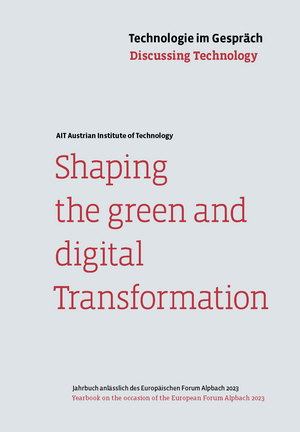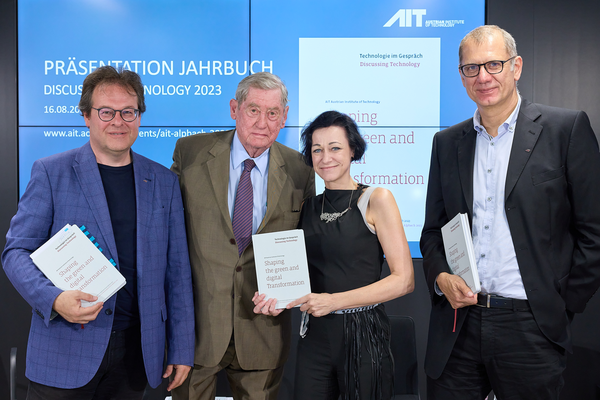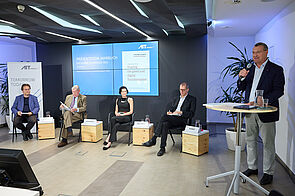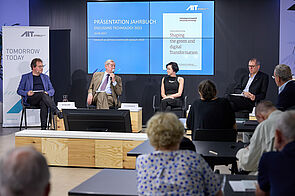On the occasion of the European Forum Alpbach, the AIT is publishing a yearbook for the seventh time. This year's theme is "Shaping the Green and Digital Transformation". As a scientific prelude to the discussions at the European Forum Alpbach, the AIT Austrian Institute of Technology is publishing the yearbook "Discussing Technology" - already for the seventh time. This year the yearbook is dedicated to the topic "Shaping the Green and Digital Transformation".
The world is undergoing a profound transformation process. The EU has coined the term "Twin Transition" for the digital and the "green" transformation, which are currently taking place in parallel. The aim is to reduce CO2 emissions and resource consumption while enabling a more sustainable and efficient way of living, working and producing through digitalisation.
This entails complex changes and requires numerous innovations.
In the contributions by Hannes Androsch, Gudrun Haindlmaier, Wolfgang Hribernik, Martin Kugler, Karl-Heinz Leitner, Helmut Leopold, Alexandra Millonig, Petra Schaper Rinkel and Matthias Weber, in addition to overarching aspects, numerous specific areas are discussed in which the transformation manifests itself - from the "energy turnaround" and smart urbanisation to new forms of mobility and production and topics such as the circular economy, geopolitics and the role of the sciences and arts. In particular, current development trends and possibilities for shaping the transformation will be highlighted.
Main topics
Foreword / Geopolitics
Hannes Androsch argues in the foreword of the Yearbook that a successful ecological and digital transformation ("Twin Transition") is a central prerequisite for solving the "tragedy of the planetary commons" - i.e. for taking care of the planetary commons (such as the atmosphere, oceans, water supply, forests, etc.). Currently, there is no one who cares about the planetary commons beyond their own interests. Geopolitically, the world is currently dominated by the struggle between China and the USA for supremacy. For Europe, a successful "Twin Transition" offers the chance to consolidate or even improve its role in the world. Technologies play a decisive role in this - on the one hand, because they have the potential to solve many global challenges, and on the other hand, because technologies are increasingly becoming the subject of geopolitical disputes: Whoever is technologically ahead today (will) shape the world in the future.
Dynamics and control of transformations
Innovation researcher Matthias Weber explains that transformations always occur when the tensions between different social developments - such as technological, economic or social - become too great. This can either manifest itself in massive system disruptions or even system collapses, which in turn force major changes in the social and economic system or enable the readiness for structural changes. Or a conscious and forward-looking attempt is made to adapt systems structurally and institutionally in such a way that system disruptions do not occur. One cannot control and steer transformations in detail. But one can define certain guard rails between which there is space for dynamic development in which new things can emerge.
Urban transformation
Urban spaces play a major role in transformations. In the eyes of urban researcher Gudrun Haindlmaier, this is because critical masses for change can be reached relatively easily in cities - whereby direct contact between people and a corresponding pressure to act are essential. The goal must be profound changes at the process and structural level. In order to support urban transformation processes, a number of instruments have been developed in recent years, the core of which is the participation of a wide range of stakeholders and actors. The involvement of multipliers and "gatekeepers" for specific target groups is crucial for success.
Energy transition
In the ongoing restructuring of our energy system ("Energiewende"), the next important step in the eyes of energy researcher Wolfgang Hribernik is to bring together the many different sectors. In addition to the decided phase-out of coal and oil, the currently necessary phase-out of natural gas means a strong electrification. On the one hand, this is a challenge for the expansion of renewable energies and the corresponding infrastructure. On the other hand, there is an increased sector coupling - for example between electricity and heat (via heat pumps) or between energy and process materials (such as hydrogen or CO2 use). In all sectors - from transport to buildings to industry - major interventions in existing infrastructures are required. In large research projects such as the NEFI (New Energy for Industry) innovation alliance, concrete technologies are currently being tested and roadmaps or transformation paths are being developed.
Mobility turnaround
The mobility researcher Alexandra Millonig points out that the transformation of the mobility system ("mobility turnaround") is an enormous task, the extent and urgency of which many people are not yet aware of. This is because the necessary strong reduction of CO2 emissions cannot be achieved by switching to low-emission or emission-free means of transport alone. Rather, a much broader view of mobility is needed - on the questions of why we travel long distances in the first place and how we can minimise daily journeys. Numerous research projects have developed individual mobility budgets and minimum mobility standards that are compatible with climate goals. In Millonig's eyes, the top priority in the "mobility turnaround" is to improve local accessibility for everyday things (including a possible shift to the virtual). The remaining demand for mobility must then be met as sustainably as possible.
Digital transformation
For digitalisation expert Helmut Leopold, the ongoing digital transformation is less about complicated technology and more about designing technology in such a way that it brings real added value. The decisive factor is therefore the design of technology and its correct use ("technology shaping"). Leopold sees fear of change as the biggest enemy of a sensible digital transformation. Instead, it is necessary to come to terms with the technologies and build up know-how for a confident handling of the technologies. This requires intensive cooperation between all participants. Such ecosystems of people, institutions and organisations with similar interests, a certain willingness to take risks and a common will to shape things are also essential drivers of innovation to alleviate the existing dependence on Chinese and US technology corporations and to increase Europe's technological sovereignty.
Industrial change
The goals of decarbonisation require a major transformation of industry. Innovation researcher Karl-Heinz Leitner sees major differences between this and the previously understood "industrial transformation": on the one hand, it is now a matter of a targeted restructuring of production and all processes under high time pressure - the drivers are politics and customers. On the other hand, many sectors are being challenged simultaneously, but in different ways. In addition, the industrial transformation requires the development of new infrastructures and the coordination of different policy fields. Leitner argues that this complex system change should also be seen as an opportunity to develop product innovations with the new processes, which can be used to open up new markets and finance the necessary investments. According to Leitner, Austrian industry is well positioned for this transformation. However, those companies that have been little or not at all innovative so far should be concerned.
Science and the arts design options for the future
The innovation researcher and designated rector of the University of Applied Arts Vienna, Petra Schaper-Rinkel, sees an integrative understanding of the world that can be generated from the sciences and arts as essential for shaping the upcoming transformations. She argues for understanding sciences (including their productive controversies) not only as methods of systematic knowledge production, but also as creative and inventive practices to develop sustainable and democratic options for the future. Such "futures" form the basis for shaping socio-technical transformation and innovation paths. Space should be given to this scientifically and artistically supported speculation. As an important aid to transformation, Schaper Rinkel suggests open and public algorithmic platforms.
Yearbooks in the Discussing Technology series published to date
- 2017: Digitalisation
- 2018: Artificial Intelligence
- 2019: Cybersecurity
- 2020: Complex Systems
- 2021: Human-centred innovation
- 2022: Applying AI
Free download of the yearbook "Discussing Technology" 2023 (as well as all yearbooks published in previous years) at https://www.ait.ac.at/news-events/ait-alpbach-2023






